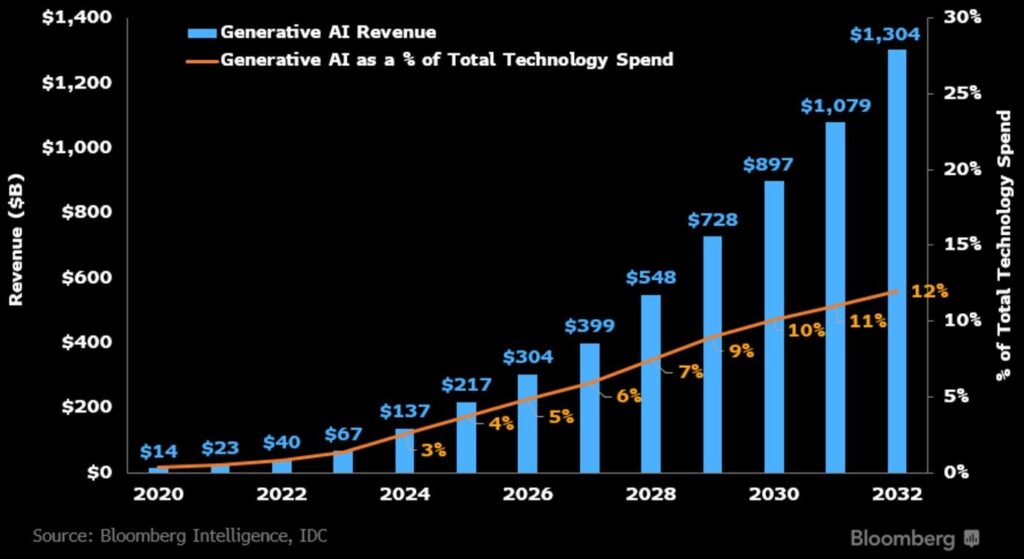I’m not going to sugarcoat anything in this edition. It’s going to be raw, and it might hurt your feelings. So either read it fully or don’t read it at all — because if you read it partially, you’ll leave with the wrong information.
Let’s begin.
Are you worried that you’re missing the AI boom — just like you missed the crypto craze in the 2010s, or the dot-com wave in the late ’90s?
Well, I want to give you some pointers to ponder before you make any decisions.
Ai Boom
Yes, we are in an AI boom — especially with generative AI and the free or extremely cheap access to knowledge and tools.
Yes, almost everyone can now build an AI solution, and the knowledge economy is collapsing. Arguing or crying about whether it’s good or bad, whether we should be for it or against it, is futile. Technology will always move forward. You can either lament about it and get drowned — or embrace it and ride the wave.
Now, this does NOT mean you can just start an AI or tech startup.
(Well, you can. But that doesn’t mean you’ll be successful.)
Let’s look at a few aspects of building a successful AI product — and ultimately, a profitable company around it.
Just because you know technology doesn’t make you a good founder
I want you to ponder on this question.
ChatGPT, Claude, Copilot — they’re easily available to everyone. There are millions of developers in the world.
With all that access, why aren’t we seeing unicorn companies, million-dollar tech companies, popping up like mushrooms after the rain?
Because building a product is the easy part. (It’s definitely easy nowadays.)
In the last 3 months, many young people have talked to me about their dreams of building a startup and shared the products they quickly built using Claude and ChatGPT.
Not to discourage anyone — but just because you could build something doesn’t mean you should have built it. And just because you thought it would be cool doesn’t mean it actually would be.
So, why are many building products and services, and almost all of them fail?
Because like I said, being excellent at technology doesn’t make you a good founder. (Ideally, a strong startup needs two founders — a tech person and a visionary.)
Now, if you don’t have a partner, then you’ll have to do this yourself for the time being until you find someone. Y Combinator has many resources you can use, and Naval Ravikant’s blog is super deep and valuable.
Ai Race is just beginning
The AI boom is just beginning. It does feel like everyone — and their dog — is building products using AI and that you’re being left behind.

Here’s the thing I want you to understand:
Yes, many are running this AI race, just like you. But apart from a very few, everyone is running on the wrong tracks.
Meaning — over the last few years, I’ve seen many clients wanting the “AI-powered” label in their operations, and many ‘founders’ taking advantage of that by promising everything (and the kitchen sink) to be AI-powered.
Proof of Concepts go well. Everyone’s happy.
Then the real Beast comes into play.
The real cost of running AI algorithms. The server costs alone scare the s*it out of customers, and they pull the plug.
So no — you’re not necessarily late to the game. But that doesn’t mean you should dive in headfirst either.
If you’re smart, you’ll be strategic about it. (I’m not talking about business proposals and pitch decks.) I’m talking about having a vision — one that’s not driven by money alone.
You need the drive to solve a real problem. Otherwise, you’ll just chase the next shiny thing and jump to that idea… without finishing what you started.
Bitter Truth: Maybe Being a Founder Isn’t for You
I know this will hurt your ego.
But it’s better you understand this now — even if it hurts — and save years of your life.

Not everyone can be a tech entrepreneur, and that’s okay. You could be an investor in a startup that a true entrepreneur builds, or you could be a CTO or CEO-level employee under a real entrepreneur.
Why?
Because being a founder is extremely hard. The ups and downs hit every few weeks. You might think you can handle it — because you see everyone and their dog being entrepreneurs on social media.
But let me tell you — it’s okay to be a good employee. It’s okay to do something else with your life.
There are people who have this innate, unquenchable thirst to conquer the world. You need that kind of flame inside you to weather the storms.
If that’s not you, I strongly recommend you drop the idea of being a founder and save yourself your money, resources, and time. Put that focus on becoming an exceptionally talented employee.
Raising the hand
There was this piece of advice a mentor gave me that has stuck with me — and I’m going to pass it on to you.

If you’re in a lecture hall and I’m the lecturer, and I ask the students to raise their hands, they will — and so will you. But do you raise your hand straight up, fully erect? Or do you raise it halfway?
You probably raise it like in the picture above, don’t you? I would too.
So the question my mentor asked me was:
“Why are you half-assing the hand raise? Why didn’t you give your 100% and raise your hand straight up?”
The point is — you can half-a** the effort you put into your job, because you’ll get your salary at the end of the month. And you can jump to a different company whenever you want.
But if you’re starting a tech company and dreaming of making it successful, you have to be all in. You have to put your 100% into your vision.
Now — this doesn’t mean you need to quit your job and spend 100% of your time on your startup. (Actually, if you can do that, then you’ll likely succeed faster — but you have to be rock solid about that decision and your discipline.)
If you’re building something on the side in your free time, then when I say 100%, I mean: Every waking minute that’s not spent on your 9-to-5 job, your health, or your relationships — must go toward your goal. No excuses.
You either go all in, or go home. There is no middle ground where you can do that “work-life balance” bullsh*t when you are a founder.
I’m being real here.
MOAT is Gone
With the knowledge and skill economy collapsing, the MOAT — the barrier to entry in the technology market — is vanishing.

Do you need a Software Engineering or Machine Learning degree to build a chatbot now?
No.
If you know English and can follow instructions, you can easily build one within half an hour. Any kid could do it.
So, how do you win in AI?
You iterate rapidly.
You don’t take 6 months to build something and another 2 months to QA test. The world would have moved so far ahead in those 8 months, you’d be irrelevant before you launch.
You need to be strategic. You need that visionary person in your team. (Unless that person is you.)
It’s hard to hear, but if you’re not the visionary type — that’s not something you can learn. Either you have it or you don’t.
So if you’re not that person, and still want to start a startup, then you need to find that person. Someone who aligns with your goals.
And most importantly — you need to keep your ego aside and let that person run things. While you focus on what you are best at: technology.
Final Words
The AI gold rush is real. But gold rushes don’t make everyone rich — they expose who’s serious and who’s just playing startup ( Remember the ‘expensive hobby’ that I keep mentioning about ).
This newsletter edition wasn’t meant to scare you off. It was meant to show you what you’re actually signing up for.
So here’s the deal:
If you still feel the fire after reading all this — the kind that keeps you up at night thinking, building, obsessing — then you just might be cut out for this. ( And I am truly happy for you )
If not, that’s perfectly fine too. But don’t lie to yourself. Because the worst thing you can do is waste years chasing a dream you were never built for.
Be honest. Be all-in. Or don’t bother.
Either way — I wish you clarity, courage, and conviction.